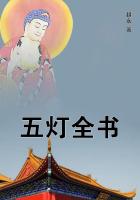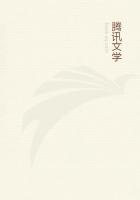IN ANCIENT EGYPT the god whose death and resurrection were annually celebrated with alternate sorrow and joy was Osiris, the most popular of all Egyptian deities; and there are good grounds for classing him in one of his aspects with Adonis and Attis as a personification of the great yearly vicissitudes of nature, especially of the corn. But the immense vogue which he enjoyed for many ages induced his devoted worshippers to heap upon him the attributes and powers of many other gods; so that it is not always easy to strip him, so to say, of his borrowed plumes and to restore them to their proper owners.
The story of Osiris is told in a connected form only by Plutarch, whose narrative has been confirmed and to some extent amplified in modern times by the evidence of the monuments.
Osiris was the offspring of an intrigue between the earth-god Seb (Keb or Geb, as the name is sometimes transliterated) and the sky-goddess Nut. The Greeks identified his parents with their own deities Cronus and Rhea. When the sun-god Ra perceived that his wife Nut had been unfaithful to him, he declared with a curse that she should be delivered of the child in no month and no year. But the goddess had another lover, the god Thoth or Hermes, as the Greeks called him, and he playing at draughts with the moon won from her a seventy-second part of every day, and having compounded five whole days out of these parts he added them to the Egyptian year of three hundred and sixty days. This was the mythical origin of the five supplementary days which the Egyptians annually inserted at the end of every year in order to establish a harmony between lunar and solar time. On these five days, regarded as outside the year of twelve months, the curse of the sun-god did not rest, and accordingly Osiris was born on the first of them. At his nativity a voice rang out proclaiming that the Lord of All had come into the world. Some say that a certain Pamyles heard a voice from the temple at Thebes bidding him announce with a shout that a great king, the beneficent Osiris, was born. But Osiris was not the only child of his mother. On the second of the supplementary days she gave birth to the elder Horus, on the third to the god Set, whom the Greeks called Typhon, on the fourth to the goddess Isis, and on the fifth to the goddess Nephthys. Afterwards Set married his sister Nephthys, and Osiris married his sister Isis.
Reigning as a king on earth, Osiris reclaimed the Egyptians from savagery, gave them laws, and taught them to worship the gods. Before his time the Egyptians had been cannibals. But Isis, the sister and wife of Osiris, discovered wheat and barley growing wild, and Osiris introduced the cultivation of these grains amongst his people, who forthwith abandoned cannibalism and took kindly to a corn diet. Moreover, Osiris is said to have been the first to gather fruit from trees, to train the vine to poles, and to tread the grapes. Eager to communicate these beneficent discoveries to all mankind, he committed the whole government of Egypt to his wife Isis, and travelled over the world, diffusing the blessings of civilisation and agriculture wherever he went. In countries where a harsh climate or niggardly soil forbade the cultivation of the vine, he taught the inhabitants to console themselves for the want of wine by brewing beer from barley. Loaded with the wealth that had been showered upon him by grateful nations, he returned to Egypt, and on account of the benefits he had conferred on mankind he was unanimously hailed and worshipped as a deity. But his brother Set (whom the Greeks called Typhon) with seventy-two others plotted against him. Having taken the measure of his good brother's body by stealth, the bad brother Typhon fashioned and highly decorated a coffer of the same size, and once when they were all drinking and ****** merry he brought in the coffer and jestingly promised to give it to the one whom it should fit exactly. Well, they all tried one after the other, but it fitted none of them. Last of all Osiris stepped into it and lay down. On that the conspirators ran and slammed the lid down on him, nailed it fast, soldered it with molten lead, and flung the coffer into the Nile. This happened on the seventeenth day of the month Athyr, when the sun is in the sign of the Scorpion, and in the eight-and-twentieth year of the reign or the life of Osiris. When Isis heard of it she sheared off a lock of her hair, put on a mourning attire, and wandered disconsolately up and down, seeking the body.
By the advice of the god of wisdom she took refuge in the papyrus swamps of the Delta. Seven scorpions accompanied her in her flight. One evening when she was weary she came to the house of a woman, who, alarmed at the sight of the scorpions, shut the door in her face. Then one of the scorpions crept under the door and stung the child of the woman that he died. But when Isis heard the mother's lamentation, her heart was touched, and she laid her hands on the child and uttered her powerful spells; so the poison was driven out of the child and he lived. Afterwards Isis herself gave birth to a son in the swamps. She had conceived him while she fluttered in the form of a hawk over the corpse of her dead husband. The infant was the younger Horus, who in his youth bore the name of Harpocrates, that is, the child Horus. Him Buto, the goddess of the north, hid from the wrath of his wicked uncle Set. Yet she could not guard him from all mishap; for one day when Isis came to her little son's hiding-place she found him stretched lifeless and rigid on the ground: a scorpion had stung him. Then Isis prayed to the sun-god Ra for help. The god hearkened to her and staid his bark in the sky, and sent down Thoth to teach her the spell by which she might restore her son to life. She uttered the words of power, and straightway the poison flowed from the body of Horus, air passed into him, and he lived. Then Thoth ascended up into the sky and took his place once more in the bark of the sun, and the bright pomp passed onward jubilant.















